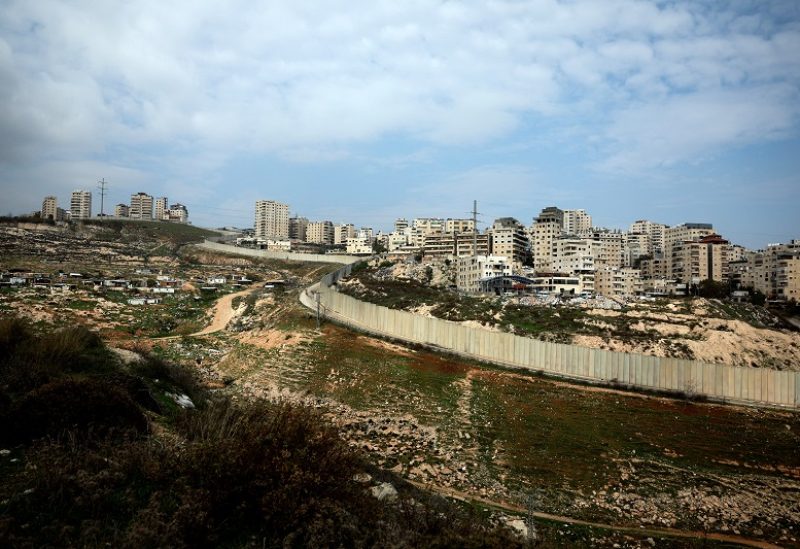
The Israeli barrier winds around the outskirts of the East Jerusalem refugee camp of Shuafat, in an area Israel annexed to Jerusalem after capturing it in the 1967 Middle East war, December 28, 2023. REUTERS/Ammar Awad
In the historic Armenian quarter of East Jerusalem, which is annexed by Israel, residents swiftly organized as bulldozers arrived to begin construction on a luxury hotel. The community is deeply concerned that this project poses a threat to their ancient yet diminishing neighborhood.
The real estate deal which gives an Australian-Israeli investor roughly 25 percent of the Old City’s Armenian quarter has sparked anger and concern among its residents.
“The youth arrived in large numbers and positioned themselves in front of the bulldozers,” recalled resident Kegham Balian of the escalation last month.
“The settlers underestimated our community,” said the Armenian merchant.
“We are waging a peaceful struggle, and we are not afraid.”
Ever since the construction began, Armenians have set up camp, bringing tents, stoves, mattresses and even a TV to a weeks-long sit-in to guard the contested land.
Inside a tent, wooden planks patch up the holes left by construction equipment.
On Thursday, “over 30 armed provocateurs” attacked members of the Armenian community including clergymen, the Armenian Patriarchate of Jerusalem said in a statement.
It accused the real estate developer, Danny Rothman, of being responsible for the “massive and coordinated physical attack” shortly after the patriarchate had taken to the court to annul the controversial land sale.
East Jerusalem and the Old City — divided into Muslim, Christian, Jewish and Armenian quarters — was seized by Israel in 1967 and annexed in a move not recognized by the international community.
Land rights are a key point of tension in east Jerusalem and the occupied West Bank, where Israel has built and expanded settlements, considered illegal under international law.
Only around 2,000 Armenians remain in the Old City quarter after waves of immigration primarily to the United States and Europe since the 1960s.
Like Palestinians in the rest of east Jerusalem, most Armenians do not hold Israeli citizenship but only residency.
Panic first erupted among the minority community in April, after it was revealed that the Armenian Patriarchate of Jerusalem and Father Baret Yeretzian, in charge of real estate affairs, struck a deal in 2021 with a Tel Aviv-based company.
The firm, which won a 99-year lease on the land, is Rothman’s Xana Gardens Ltd, according to Israeli lawyer and Jerusalem specialist Daniel Seidemann.
“The agreement was reached by the patriarchate without the knowledge and without the consent of the residents of the Armenian quarter or their institutions,” Seidemann told AFP, an assertion echoed by community members.
The contract included “11,500 square meters (2.8 acres) of land, including a parking lot, five residences, and the patriarchate’s seminar hall,” said Setrag Balian, co-founder of Save the ArQ, a movement by Armenian quarter residents.
Despite the Armenian Patriarchate saying it had subsequently “withdrawn from negotiations” after discovering “problems behind this transaction,” many community members still feel betrayed.
Yeretzian, the priest behind the contract has been defrocked.
The latest escalation came after Nourhan Manougian, the Armenian patriarch of Jerusalem, on October 27 sent a letter to Xana Gardens formally notifying the firm of the “cancelation of the agreement.”
Then, “bulldozers, armed settlers accompanied by dogs, and residents of the Jewish quarter” arrived to the area, said the activist Balian, 27.
The takeover attempt “took advantage of the chaos of October 7,” he said, referring to the bloody attack by Palestinian militant group Hamas on Israel that triggered all-out war.
“They managed to demolish part of the wall surrounding the parking lot.”
Rothman’s lawyer, Avi Savitzki, declined to comment when contacted by AFP.
Campaigners say they are trying to preserve the land of the Armenian community, whose presence in Jerusalem dates as far back as 1,500 years.
Save the ArQ is also supported by Armenian diaspora communities with legal assistance and media coverage.
“Every day, families come to see us and bring us food,” said Kegham Balian of the sit-in, where young and old take turns sleeping at the site.
They hope the land does not befall the same fate of some Greek Orthodox Church property in Jerusalem.
Israeli settler group Ateret Cohanim, using front companies, in 2004 acquired leasing rights on three building belonging to the church.
After years legal battles, Israel’s top court eventually allowed Ateret Cohanim to take hold of the property.
This judicial setback “endangers the Christian presence and the integrity of the Christian quarter,” said activist Hagop Djernazian.
To Balian, “we know the political stakes” in the divided holy city, a focal point of the Israeli-Palestinian conflict.
“It will not be an easy battle, especially since we are not just fighting against a private company but also against settlers,” he said.
But “we are ready.”